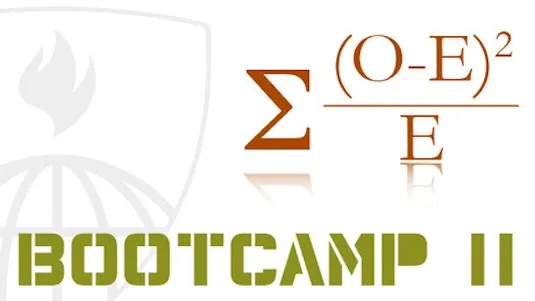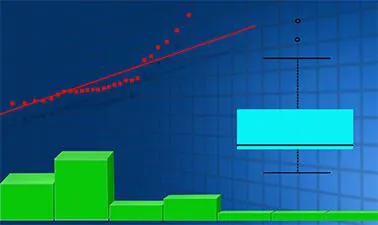
Mathematical Biostatistics Boot Camp 2 
This boot camp provides an introduction to the fundamental concepts of data analysis and statistical inference, with a focus on one and two independent samples. Participants will gain a comprehensive understanding of mathematical biostatistics. ▼
ADVERTISEMENT
Course Feature
![]() Cost:
Cost:
Free
![]() Provider:
Provider:
Coursera
![]() Certificate:
Certificate:
Paid Certification
![]() Language:
Language:
English
![]() Start Date:
Start Date:
24th Jul, 2023
Course Overview
❗The content presented here is sourced directly from Coursera platform. For comprehensive course details, including enrollment information, simply click on the 'Go to class' link on our website.
Updated in [March 06th, 2023]
The Mathematical Biostatistics Boot Camp 2 course provides students with an introduction to fundamental concepts in data analysis and statistical inference. This course focuses on one and two independent samples, and covers topics such as hypothesis testing, confidence intervals, and linear regression. Students will gain an understanding of the principles of data analysis and statistical inference, and will be able to apply these principles to real-world problems. The course also provides an introduction to the use of software for data analysis and statistical inference. Upon completion of the course, students will have a solid foundation in data analysis and statistical inference, and will be able to apply these skills to their own research.
[Applications]
The application of the Mathematical Biostatistics Boot Camp 2 course can be seen in a variety of fields. It can be used to analyze data in the medical field, such as to compare the effectiveness of different treatments. It can also be used in the social sciences to compare the differences between two groups of people. Additionally, it can be used in the business world to compare the performance of different products or services. Finally, it can be used in the field of economics to compare the performance of different markets. With the knowledge gained from this course, individuals can gain a better understanding of data analysis and statistical inference, allowing them to make more informed decisions.
[Career Paths]
1. Data Scientist: Data Scientists are responsible for collecting, analyzing, and interpreting large amounts of data to identify trends and patterns. They use their findings to develop strategies and solutions to improve business operations. Data Scientists are in high demand due to the increasing need for data-driven decision making in the business world.
2. Biostatistician: Biostatisticians use statistical methods to analyze data related to health and medicine. They are responsible for designing and conducting studies, analyzing data, and interpreting results. They also provide advice on the design of clinical trials and other research projects.
3. Epidemiologist: Epidemiologists study the distribution and determinants of health-related states or events in specified populations, and the application of this study to the control of health problems. They use a variety of methods, including surveys, interviews, and laboratory tests, to collect and analyze data.
4. Research Analyst: Research Analysts are responsible for collecting, analyzing, and interpreting data to inform decision-making. They use a variety of methods, such as surveys, interviews, and laboratory tests, to collect and analyze data. They also develop reports and presentations to communicate their findings.
[Education Paths]
1. Bachelor of Science in Biostatistics: This degree program provides students with a comprehensive understanding of biostatistical principles and methods. Students learn to apply statistical methods to analyze and interpret data related to biological and medical sciences. This degree program also covers topics such as epidemiology, public health, and health services research. The developing trend in this field is the use of machine learning and artificial intelligence to analyze large datasets.
2. Master of Science in Biostatistics: This degree program provides students with advanced knowledge and skills in biostatistical methods and data analysis. Students learn to apply statistical methods to analyze and interpret data related to biological and medical sciences. This degree program also covers topics such as epidemiology, public health, and health services research. The developing trend in this field is the use of big data and predictive analytics to improve healthcare outcomes.
3. Doctor of Philosophy in Biostatistics: This degree program provides students with an in-depth understanding of biostatistical principles and methods. Students learn to apply statistical methods to analyze and interpret data related to biological and medical sciences. This degree program also covers topics such as epidemiology, public health, and health services research. The developing trend in this field is the use of data mining and predictive analytics to improve healthcare outcomes.
4. Master of Public Health in Biostatistics: This degree program provides students with an understanding of biostatistical principles and methods as they relate to public health. Students learn to apply statistical methods to analyze and interpret data related to public health. This degree program also covers topics such as epidemiology, public health, and health services research. The developing trend in this field is the use of data science and predictive analytics to improve public health outcomes.
Pros & Cons

Complements mathematical statistics book.

High quality videos.

Rigorous and thorough cover of all distributions and hypothesis tests.

Chaotic course structure.

Quiz questions lack information.

Last week was rushed and unclear.
Course Provider

Provider Coursera's Stats at AZClass
Discussion and Reviews
0.0 (Based on 0 reviews)
Explore Similar Online Courses

College Composition

AP Psychology - Course 6: Exam Preparation & Review

Python for Informatics: Exploring Information

Social Network Analysis

Introduction to Systematic Review and Meta-Analysis

The Analytics Edge

DCO042 - Python For Informatics

Causal Diagrams: Draw Your Assumptions Before Your Conclusions

Whole genome sequencing of bacterial genomes - tools and applications

Doing Clinical Research: Biostatistics with the Wolfram Language

Introduction to Applied Biostatistics: Statistics for Medical Research


Start your review of Mathematical Biostatistics Boot Camp 2